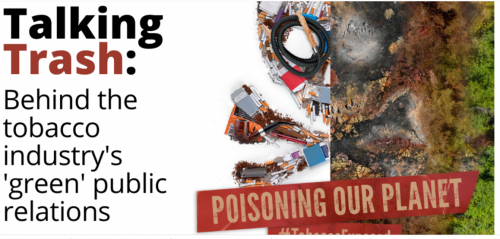
https://www.paho.org/en/documents/talking-trash-behind-tobacco-industrys...
STOP partnered with the WHO and the FCTC Secretariat to expose greenwashing, the disinformation tactic used by organizations to present an environmentally responsible image. Read the brief or watch the webinar to learn more.
This celebration is not a one off: Elsewhere the company claims it achieved a “gold standard” in another index of Environmental, Social and Governance (ESG) reporting. It has also won an award for being a climate leader from the Financial Times.
At an influential investor event in February 2022, the company devoted slide after slide to its ESG achievements, including one slide dedicated to all the recent ESG awards it had won.
The carefully crafted message to financial analysts, the media and policymakers is simple: This is a company that has global recognition for its commitment to people and the planet. Nor is it alone in its sector. One of its main competitors was recently awarded “A-List” status in a sustainability index for the fifth year in a row by the Climate Disclosure Project (CDP).
You would be forgiven for thinking that these companies were truly global sustainability leaders, making sustainable products. But you would be wrong. The first company is British American Tobacco (BAT) and the second is Philip Morris International (PMI). They are two of the world’s largest transnational tobacco companies, which are part of an industry whose main products kill one in two long-time users, contributing to more than 8 million deaths per year.
All tobacco companies promote their ESG rankings and accreditations. All four of the world’s largest tobacco companies, BAT, PMI, Japan Tobacco International (JTI) and Imperial Brands, feature the CDP and other environmental rankings prominently on their websites.
They know what they are doing: Their message implies they are truly sustainable. Yet there are three dirty secrets to these kinds of ranking schemes:
1. Sustainable investment analysts have warned that ESG criteria generally do not consider the sustainability of the company’s actual core product or services at all, instead focusing on how a company operates, rather than what it actually does. This means that tobacco can score “perversely” highly.9 As Tobacco Free Portfolios points out: “the core purpose and impact of the business is not necessarily considered amongst the ESG or sustainability factors.”
Therefore ESG awards typically ignore the unique harm and deadliness of tobacco products. Furthermore, tobacco companies typically are not evaluated against truly sustainable companies, only against each other.
2. Companies are also able to take advantage of the fact that there is no single, globally agreed protocol for assessing companies’ ESG activity. Worldwide, there are over 600 different ESG approaches with no harmonization.And as there are no standardized disclosure requirements for ESG reporting, tobacco companies could be free to share only the sustainability data that paints them in a positive light.
3. Tobacco companies are also free to set their own sustainability goals, with little or no external scrutiny. When a goal is not met, a company can simply choose not to report it, and even drop it moving forward. If one ESG accreditor gives them a poor assessment, companies can simply withdraw their participation in that accreditation scheme. For example, when BAT, JTI and Imperial Brands received poor ratings from CDP Forestry on disclosure and impact in 2017, all three opted out of the scheme.13 The way the industry uses these so-called “sustainability awards,” when the scheme portrays them in a good light, is a classic case of greenwashing.










Add new comment